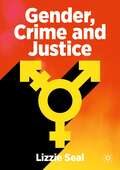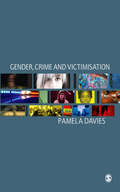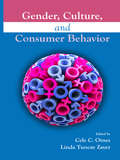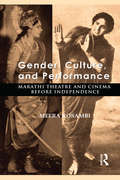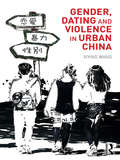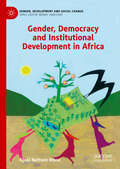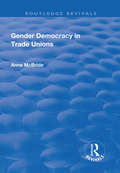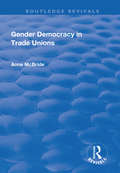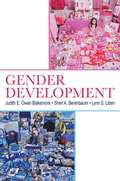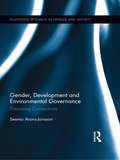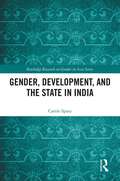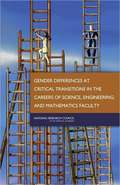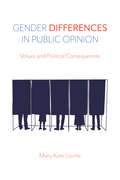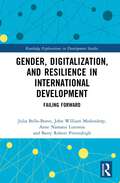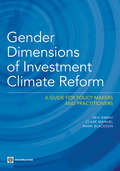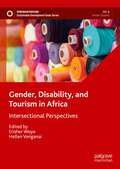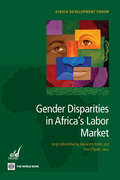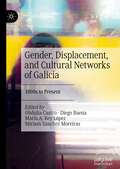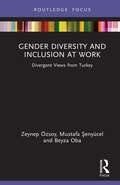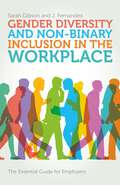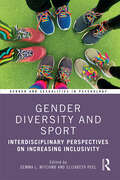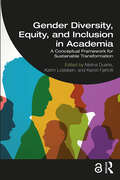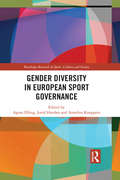- Table View
- List View
Gender, Crime and Criminal Justice
by Sandra L. WalklateThis book provides a lucid and highly acclaimed introduction to gender issues in crime and criminal justice, central to any understanding of crime and criminal justice policy and practice. This second edition has been updated to take full account of recent developments, particularly in the areas of policing, crime prevention, restorative justice and legislation relating to sexual offences and the nature and impact of crime on women ? in particular the Sexual Offences Act 2003. Gender, Crime and Criminal Justice is divided into three main sections. The first considers different ways of theorising about gender and the relative impact of this on thinking about crime and criminal victimisation; the second considers some of the evidence in relation to people's gendered experiences of crime and criminal victimisation; the third considers how those working within the criminal justice system, and the policies that are put in place, work to sustain or change those experiences of crime and criminal victimisation in relation to gender.
Gender, Crime and Justice
by Lizzie SealThis textbook takes a gender inclusive and intersectional feminist approach to examining key topics related to gender, crime and justice. It provides an overview and critical discussion of contemporary issues and research in this area suitable for use in undergraduate and postgraduate degree modules. A key feature of the book is its use of films, television series and documentaries to illustrate the concepts and findings from criminological research on gender, crime and justice. After outlining the meaning of gender and the perspective of intersectional feminism, it has chapters focused on interpersonal and sexual violence, sex work and the night-time economy, street crime, crimes of the powerful, policing and the courts, prison and community penalties and a final chapter on extreme punishment and abolitionist futures. It speaks to students and academics in criminology, sociology and gender studies.
Gender, Crime and Victimisation
by Pamela DaviesGender, Crime and Victimisation is a thoughtful and thought-provoking book, exploring gender patterns in both offending and victimisation. It offers a thorough examination of how these patterns in society are variously established and represented, researched, explained and responded to by policy makers and criminal justice agencies. Bringing together key theory, research and policy developments, the book combines perspectives on the study of criminology with those of victimology and gender studies - drawing particularly on the influence of feminism. It analyses processes of criminalisation and social control, and their structural biases. It explores fears, anxieties and worries about crime, as well as particular vulnerabilities to crime. The book employs a range of learning devices to support the student reader, including: o Chapter overviews o Case studies and examples o Study questions o Further reading at the end of each chapter o A comprehensive glossary Comprehensive and robust, Gender, Crime and Victimisation provides a stimulating and topical overview that will appeal to undergraduates,
Gender, Culture, and Consumer Behavior
by Cele C. Otnes Linda Tuncay ZayerThis book covers the gamut of topics related to gender and consumer culture. Changing gender roles have forced scholars and practitioners to re-examine some of the fundamental assumptions and theories in this area. Gender is a core component of identity and thus holds significant implications for how consumers behave in the marketplace. This book offers innovative research in gender and consumer behavior with topics relevant to psychology, marketing, advertising, sociology, women’s studies and cultural studies. It offers 16 chapters of cutting-edge research on gender, international culture and consumption. Unique to this volume is its emphasis on consumption and masculinity and inclusion of topics on a rapidly changing world of issues related to culture and gender in advertising, communications, psychology and consumer behavior.
Gender, Culture, and Performance: Marathi Theatre and Cinema before Independence
by Meera KosambiThis book presents a lucid, comprehensive, and entertaining narrative of culture and society in late 19th- and early 20th-century Maharashtra through a perceptive study of its theatre and cinema. An intellectual tour de force, it will be invaluable to scholars and researchers of modern Indian history, theatre and film studies, cultural studies, sociology, gender studies as well as the interested general reader.
Gender, Dating and Violence in Urban China (Routledge Culture, Society, Business in East Asia Series)
by Wang XiyingThis book explores young people’s experiences of, and views on, dating, gender, sexuality, sexual hegemony and violence within dating relationships. Based on interviews and focus groups conducted in Beijing over a decade, and focusing especially on dating violence, the book reveals provides insights into a wide range of issues of gender and sexuality in contemporary China. It shows how young Chinese people’s attitudes and behaviors are changing as urban China develops rapidly, and how their experience of dating violence and meaning-making are affected by age, gender, location and class.
Gender, Democracy and Institutional Development in Africa (Gender, Development and Social Change)
by Njoki Nathani WaneThis book analyses African foundations of gender, education, politics, democracy and institutional development by stimulating theoretical discourses. It offers a discursive framework on ways to examine the conceptualizations of African social development and a critical discourse on debunking the misconceptions that are attached to African location in the global arena. The volume challenges the danger of minimizing and oversimplifying the role of Africa in the international space. This will be ideal for researchers, students and scholars in the areas of African and gender studies, development, politics and education.
Gender Democracy in Trade Unions (Routledge Revivals)
by Anne McBrideThis title was first published in 2001. Detailed interviews with activists and case studies of decision-making bodies show how different membership groups exploit equal opportunities strategies to facilitate or impede women. These case studies expose the conundrum of understanding women as a differentiated but distinct membership group. They illustrate why women activists need to be understood in their diverse and multiple roles of being low paid workers, black women, lesbians and members of political parties, but also demonstrate that women are most empowered when treated as an oppressed social group.
Gender Democracy in Trade Unions (Routledge Revivals Ser.)
by Anne McBrideThis title was first published in 2001. Detailed interviews with activists and case studies of decision-making bodies show how different membership groups exploit equal opportunities strategies to facilitate or impede women. These case studies expose the conundrum of understanding women as a differentiated but distinct membership group. They illustrate why women activists need to be understood in their diverse and multiple roles of being low paid workers, black women, lesbians and members of political parties, but also demonstrate that women are most empowered when treated as an oppressed social group.
Gender Development
by Sheri A. Berenbaum Lynn S. Liben Judith E. BlakemoreThis new text offers a unique developmental focus on gender. Gender development is examined from infancy through adolescence, integrating biological, socialization, and cognitive perspectives. The book's current empirical focus is complemented by a lively and readable style that includes anecdotes about children's everyday experiences. The book's accessibility is further enhanced with the use of bold face to highlight key terms when first introduced along with a complete glossary of these terms. All three of the authors are respected researchers in divergent areas of children's gender role development and each of them teaches a course on the topic. The book's primary focus is on gender role behaviors - how they develop and the roles biological and experiential factors play in their development. The first section of the text introduces the field and outlines its history. Part 2 focuses on the differences between the sexes, including the biology of sex and the latest research on behavioral sex differences, including motor and cognitive behaviors and personality and social behaviors. Contemporary theoretical perspectives on gender development - biological, social and environmental, and cognitive approaches - are explored in Part 3 along with the research supporting these models. The social agents of gender development, including children themselves, family, peers, the media, and schools are addressed in the final part. Cutting-edge and comprehensive, this is the perfect text for those who have been searching for an advanced undergraduate and/or graduate book for courses in gender development, the psychology of sex roles and/or gender and/or women or men, taught in departments of psychology, human development, and educational psychology. Although chapters have been designed to be read sequentially, a full author citation is included the first time a reference is used within an individual chapter rather than only the first time it is used in the book, making it easy to assign chapters in a variety of orders. This referencing system will also appeal to scholars interested in using the book as a resource to review a particular content area.
Gender, Development and Environmental Governance: Theorizing Connections (Routledge Research in Gender and Society #33)
by Seema Arora-JonssonA major challenge in studies of environmental governance is dealing with the diversity of the people involved at multiple levels – villagers, development agents, policy-makers, private resource users and others – and taking seriously their aspirations, conflicts and collaborations. This book examines this challenge in two very disparate parts of our world, exploring what gender-equality, resource management and development mean in real terms for its inhabitants as well as for our environmental futures. Based on participatory research and in-depth fieldwork, Arora-Jonsson studies struggles for local forest management, the making of women’s groups within them and how the women’s groups became a threat to mainstream institutions. Insights from India, consistently ranked as one of the most gender-biased countries, are compared with similar situations in the ostensibly gender-equal Sweden. Arora-Jonsson also analyzes how dominant ideas about the environment, development and gender equality shape the spaces in which women and men take action through global discourses and grassroots activism. Questioning the conventional belief that development brings about greater gender equality and more efficient environmental management, this volume scrutinizes how environmental imaginations are key to crafting gender relations. It shows gender to be at the heart of environmental negotiations while at the same time making a case for environmental sensibilities as integral to gender relations. At the confluence of development, environmental and gender studies, the book contributes to a much-needed dialogue between these fields, proposing new futures in environmental management.
Gender, Development, and the State in India (Routledge Research on Gender in Asia Series)
by Carole SparyThis book explores the relationship between the state, development policy, and gender (in)equality in India. It discusses the formation of state policy on gender and development in India in the post-1990 period through three key organising concepts of institutions, discourse, and agency. The book pays particular attention to whether the international policy language of gender mainstreaming has been adopted by the Indian state, and if so, to what extent and with what results. The author examines how these issues play out at multiple levels of governance – at both the national and the subnational (state) level in federal India. This comparative aspect is particularly important in the context of increasing autonomy in development policymaking in India in the 1990s, divergent development policy approaches and outcomes among states, and the emerging importance of subnational state development policies and programmes for women in this period. The author argues that the state is not a monolith but a heterogeneous, internally differentiated collection of institutions, which offers complex and varying opportunities and consequences for feminists engaging the state. Demonstrating that the Indian empirical case is illuminating for studies of the gendered politics of development, and international debates on gender mainstreaming, the book highlights the politics of negotiating gender equality strategies in the contemporary context of neo-liberal development and brings together complex issues of modernity, postcolonialism, identity politics, federalism, and equality within the broader context of the world’s largest democracy. This book will be of interest to scholars interested in the politics of gender equality, state feminism, and gender mainstreaming; federalism and multi-level governance; and development studies and gender in South Asia.
Gender Differences at Critical Transitions in the Careers Of Science, Engineering, and Mathematics Faculty
by National Research Council of the National AcademiesGender Differences at Critical Transitions in the Careers of Science, Engineering, and Mathematics Faculty presents new and surprising findings about career differences between female and male full-time, tenure-track, and tenured faculty in science, engineering, and mathematics at the nation's top research universities. Much of this congressionally mandated book is based on two unique surveys of faculty and departments at major U.S. research universities in six fields: biology, chemistry, civil engineering, electrical engineering, mathematics, and physics. A departmental survey collected information on departmental policies, recent tenure and promotion cases, and recent hires in almost 500 departments. A faculty survey gathered information from a stratified, random sample of about 1,800 faculty on demographic characteristics, employment experiences, the allocation of institutional resources such as laboratory space, professional activities, and scholarly productivity. This book paints a timely picture of the status of female faculty at top universities, clarifies whether male and female faculty have similar opportunities to advance and succeed in academia, challenges some commonly held views, and poses several questions still in need of answers. This book will be of special interest to university administrators and faculty, graduate students, policy makers, professional and academic societies, federal funding agencies, and others concerned with the vitality of the U.S. research base and economy.
Gender Differences in Aspirations and Attainment
by Ingrid Schoon Jacquelynne S. EcclesWhat is the role of parents, peers and teachers in shaping school experiences and informing the career choice of males and females? Does the school context matter, and to what extent do educational experiences influence young people's self-concept, values and their outlook to the future? Do teenage aspirations influence later outcomes regarding educational attainment and the assumption of work and family related roles? These questions and more are addressed in the chapters of this book, following lives over time and in context. The book is both innovative and timely, moving the discussion of gender inequalities forward, providing a dynamic and contextualized account of the way gendered lives evolve. Chapters address the role of institutional structures and the wider socio-historical context in helping young men and women to realize their ambitions. A unique feature is the longitudinal perspective, examining the role of multiple interlinked influences on individual life planning and attainment.
Gender Differences in Public Opinion: Values and Political Consequences
by Mary-Kate LizotteIn this era in which more women are running for public office—and when there is increased activism among women—understanding gender differences on political issues has become critical. In her cogent study, Mary-Kate Lizotte argues that assessing the gender gap in public support for policies through a values lens provides insight into American politics today. There is ample evidence that men and women differ in their value endorsements—even when taking into account factors such as education, class, race, income, and party identification. In Gender Differences in Public Opinion, Lizotte utilizes nationally representative data, mainly from the American National Election Study, to study these gender gaps, the explanatory power of values, and the political consequences of these differences. She examines the gender differences in several policy areas such as equal rights, gun control, the death penalty, and the environment, as well as social welfare issues. The result is an insightful and revealing study of how men and women vary in their policy positions and political attitudes.
Gender, Digitalization, and Resilience in International Development: Failing Forward (Routledge Explorations in Development Studies)
by Julia Bello-Bravo John William Medendorp Anne Namatsi Lutomia Barry Robert PittendrighThis book explores the intersection of gender, digitalization, and resilience in international development. Building resilience is increasingly seen as crucial when planning and implementing development programmes, enabling communities to mitigate, adapt to, and recover from shocks and stresses in a manner that reduces chronic vulnerability and facilitates inclusive growth. Gender plays a crucial role in the resilience of development systems, as the exclusion of women from participation can make communities more vulnerable to economic shocks, perpetuating and even worsening current levels of poverty, instability, and insecurity. Drawing on meta-data from across the world, as well as specific case studies from Ghana, Kenya, Burkina Faso, and Mozambique, this book reflects on these intersections and the potential of digitalization as a democratizing tool for improving the access of women and other marginalized groups to information vital for their participation in the process of development. By outlining the importance of digitalization for addressing gender imbalances, this book draws the evidentiary lines between the role of digitalization for women and resilience as a whole. This book will be of interest to development practitioners and policy makers, as well as researchers with specialisms in gender inclusion, resilience, digitalization, and international development.
Gender Dimensions of Investment Climate Reform: A Guide for Policy Makers and Practitioners
by Sevi Simavi Clare Manuel C. Mark BlackdenThe economic empowerment of women is increasingly seen as one of the most important forces behind economic growth and the fight against poverty. Indeed, women's economic participation in an economy as entrepreneurs, employees, and leaders is recognized as a measure of a country's dynamism and viability. 'Gender Dimensions of Investment Climate Reform' provides fresh solutions to common issues that women entrepreneurs face. It presents actionable, replicable, and scalable tools for promoting gender-sensitive investment climate reforms that would benefit both women and men. The book enables development practitioners and policy makers who are not gender specialists to diagnose gender issues in an investment climate; design creative and practical solutions and recommendations for addressing gender constraints; and monitor and evaluate the implementation of those recommendations.
Gender, Disability, and Tourism in Africa: Intersectional Perspectives (Sustainable Development Goals Series)
by Erisher Woyo Hellen VenganaiThis book explores the intersection of gender and disability in the context of tourism. In part, the book foregrounds feminist theorising of intersectionality by examining how gender can overlap with other social identities to contribute to more systemic oppression, domination, discrimination, and marginalisation of certain categories of people. Our point of departure is that disability does not operate in isolation as it is constituted and experienced within an already gendered social and tourism environment. With substantial research on the intersection of gender and tourism on the one hand, and the intersection of disability and tourism on the other hand, the interconnectedness of gender and disability and the implications this has on tourism policy and practice remains understudied. Thus, the book provides a critical lens that helps unpack underlying assumptions about gender and disability while questioning the dominant ideas about gender and disability reproduced through tourism policies and institutional practices in an African context. This book will be of interest to scholars and researchers in Gender Studies, Disability Studies, and Tourism Studies, particularly those with a research interest in Africa.
Gender Disparities in Africa's Labor Market
by Jorge Saba Arbache Alexandre Kolev Ewa FilipiakWomen's earnings are a fraction of male's earnings in several African countries. It is tempting to conclude that this wage gap is a sign of discrimination against women in the labor market. Yet this book uses new datasets to show that the gap is not simply the result of discrimination in the labor markets, but rather the result of multiple factors, including access to education and credit, cultural values and household duties, and, above all, labor market conditions. It shows that gender disparities grow when economies are not functioning well and labor markets are tiny. More than the effect of discrimination, it seems that job rationing causes those with better human capital and those with more power in the household-usually the men-to take the few jobs that are available. It is hardly surprising, then, that in a region where only a fraction of the labor force finds jobs in the formal sector, gender disparities in earnings are so high. The book further documents that firm-level and sector characteristics are additional powerful factors in explaining the gender disparities in the labor market. As the causes are not simple, neither are the solutions; multifaceted strategies are needed. By providing environments that support economic growth and, more importantly, job creation, as well as by promoting equal access for women to education and rethinking the attitudes that limit what women may achieve, governments in the region will substantially improve the well-being of all their peoples. 'Gender Disparities in Africa's Labor Market' helps to fill the knowledge gap and identify the links between gender disparities and poverty reduction. The work was implemented in collaboration with a range of poverty and labor market studies to maximize its usefulness for policy dialogue in specific countries. This book will be of interest to policy makers, students, academics, gender experts, and all those interested in gender issues and development.
Gender, Displacement, and Cultural Networks of Galicia: 1800s to Present
by Obdulia Castro Diego Baena María A. Rey López Miriam Sánchez MoreirasThis book, bringing together a multi-voiced dialogue between academic scholars and professionals from diverse fields, shares a comprehensive and heterogeneous look at the interdisciplinarity of Galician Studies while examining a chronologically broad range of subjects from the 1800s to the present. This volume carves out a distinct approach to gender studies investigating issues of culture, language, displacement, counterculture artists, and community projects as related to questions of politics, gender and class. Women, conceived as both individual and political bodies, are studied, among other things, as an example of what it means to struggle from the margins emphasizing the importance of looking at the opposition between the center and the peripheries when studying the relationship between space and culture.
Gender Diversity and Inclusion at Work: Divergent Views from Turkey (Routledge Focus on Business and Management)
by Zeynep Özsoy Mustafa Şenyücel Beyza ObaThe purpose of this book is to investigate gender diversity practices and discourse developed by listed companies in Turkey. It pursues this aim by advancing knowledge about business relations affecting workplace gender diversity. The research builds on Bourdieu’s field approach and implements a Thematic Analysis following Braun and Clarke’s (2006) guidelines. The findings of the book are based on data collected from unstructured interviews and secondary sources such as the official documents of national and international organizations, newspapers, legislation, and web pages of the related parties. The findings suggest that the implementation of gender diversity practices may require a transformation of perspective and the conditions regarding the political, economic, and cultural realm for realization of a pervasive movement. Due to the conservative and patriarchal culture, authoritarian rule and neoliberal policies, gender diversity and inclusion are not seen as issues that should be resolved through the commitment and collaboration of a field. Consequently, diversity management practices are instrumentalized by the business community as a means for corporate communication and image building rather than actively building a diverse workforce.
Gender Diversity and Non-Binary Inclusion in the Workplace: The Essential Guide for Employers
by Sarah Gibson J. FernandezHelping to create inclusive work environments for non-binary people, this book builds knowledge of non-binary identities and provides practical solutions to many of the basic workplace problems this group face. Working with and including non-binary people in the workplace is beneficial for both employer and employee, as it attracts and retains younger and non-binary workers by helping promote an inclusive brand, as well as satisfying equality obligations. Based on novel research of non-binary inclusion within businesses, it provides a basic overview of non-binary people, a business case for inclusion, a brief description of how non-binary people fit into current equality laws and likely future developments in the area. An ideal introduction for companies wishing to embrace all genders in the workplace.
Gender Diversity and Sport: Interdisciplinary Perspectives (Gender and Sexualities in Psychology)
by Gemma L. WitcombThis timely and urgent text presents cutting-edge research exploring the complexities of barriers to inclusive access to sport and physical activity, and discusses how sport, and society, can move forward beyond the gender binary, in both theory and practice. Sport is one of the most influential, powerful, and visible institutions upholding the gender binary, even as the number of people identifying as transgender and non-binary increases rapidly worldwide. With this rising visibility, societal pressure has been increasing for the equal acceptance of gender diverse people, but while gains have been made in many areas, the participation of intersex, trans and non-binary people in sport remains harshly contested. Bringing together a world-leading team of established and emerging scholars from the UK, USA, and Australia, this collection presents an interdisciplinary analysis of current issues related to the participation of gender diverse individuals in sport and physical activity. Engaging with psychological ideas around identity, prejudice and discrimination, and sports psychology and performance, authors examine evidence that the rules, regulations, and practices that surround physical activity participation – from elite sport to sport in schools, universities, and society at large – are grounded in heteronormative, cisgendered, and sexist practices which unfairly discriminate against gender diverse people. Also including analysis of personal accounts from non-binary and transgender athletes from a range of sports, this is fascinating and essential reading for education, health, and sports professionals who work with and support gender diverse children and adults, as well as academics and students in the fields of psychology, sport psychology, sociology, law, and sports science, and those participating in, and navigating, sport and physical activity spaces.
Gender Diversity, Equity, and Inclusion in Academia: A Conceptual Framework for Sustainable Transformation
by Melina Duarte Katrin Losleben Kjersti FjørtoftInstitutional focus on diversity, equity, and inclusion affects all parts of higher education management. Gender Diversity, Equity, and Inclusion in Academia: A Conceptual Framework for Sustainable Transformation scrutinises the conceptual framework for diversity, equity, and inclusion actions in academia to facilitate research-based and critically reflected decisions in higher education management. The book contains 24 chapters, each focused on one of 24 fundamental concepts that are essential for identifying, understanding, and implementing organizational changes and counteracting unjustified disadvantages faced by women and members of other gender minorities in academia, preceded by an introductory binding chapter. The book also discusses concepts directed towards solutions, such as affirmative action and feminist pedagogies, and overcomes the traditional binary approach on gender by incorporating specific challenges faced by LGBTQ+ and transgender staff and students. Gender Diversity, Equity, and Inclusion in Academia will be key reading for academics in Gender Studies and Education Studies, while also serving as a vital resource for individual consumers working in or preparing to enter leadership positions in higher education.
Gender Diversity in European Sport Governance (Routledge Research in Sport, Culture and Society)
by Agnes Elling Jorid Hovden Annelies KnoppersGender equality is one of the founding democratic principles of the EU. However, recent studies of the Federation of Olympic Sports in Europe have shown that women occupy only fourteen percent of decision-making positions in sport organizations. This book presents a comprehensive and comparative study of how various regions and countries of Europe have addressed this lack of gender diversity, discussing which strategies have brought about change and to what extent these changes have been successful. With contributions from leading sport sociologists, covering countries such as Germany, Hungary, Norway, Poland, Spain, Turkey and the UK, it provides a foundation for future policymaking, methodological analyses and theoretical developments that can result in sustainable gender equality in European sport governance. Gender Diversity in European Sport Governance is important reading for scholars and students in the fields of sociology of sport, sport management, sociology, gender studies and studies of organization, management and leadership. It is also a valuable resource for policy makers in the EU, as well as national sport organizations and activists.

